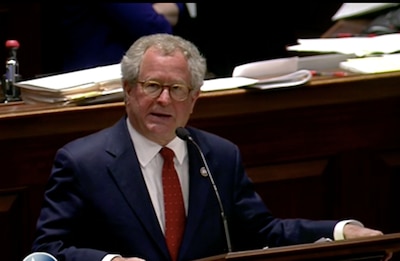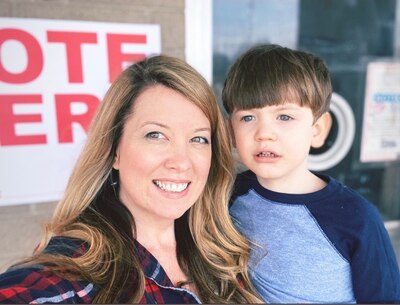For legislative candidate Jerri Green, Tennessee’s controversial school voucher law represents everything that’s wrong with lawmakers who passed the measure using tactics leading to the law being overturned this year in court.
“The voucher law was emblematic of the dark money and backroom deals that we need to put an end to,” said Green, a Memphis Democrat, about campaign contributions from pro-voucher groups, as well as House leaders who limited the bill’s application to Memphis and Nashville in exchange for votes from lawmakers elsewhere in the state.
“As a lawyer, it irritates me to no end to see our legislature pass laws that are unconstitutional on their face,” Green added.
In one of the legislature’s most high-profile races, Green is considered a serious challenger to Republican Rep. Mark White, who as chairman of the House Education Committee controls much of the flow of legislation related to K-12 education.
They are polar opposites on the issue of vouchers, which let eligible families use taxpayer money to pay for private schools for their children’s education.
Green says the policy takes both students and funding away from already underfunded public schools. White supported Gov. Bill Lee’s voucher plan for giving families more educational choices.
“I think COVID has really put a spotlight on the need for more parental choice when it comes to education,” White said.
Their race is among dozens in which challengers to incumbents in Tennessee’s GOP-controlled legislature are bringing up the 2019 voucher law. In September, a state appeals court affirmed a lower court’s ruling that overturned the law because it targeted two counties without giving them a say.
While at least 40 school boards approved resolutions against any state policies that shift public funding from public to private schools, the House passed the voucher bill 50-48 after then-Speaker Glen Casada held the voting board open for 38 minutes to convince Rep. Jason Zachary of Knoxville to flip for vouchers and break a tie. During the fierce legislative battle, Zachary was the last of several key GOP lawmakers who, one by one, changed their votes to support the bill in exchange for assurances that their counties would be shielded from its application.
“It was an ugly vote, and vouchers certainly haven’t gone away as an issue,” said Marcus Pohlmann, a political science professor at Rhodes College who follows K-12 education issues affecting Memphis and Shelby County. “Some of these legislators are so well-entrenched they can get away with it during an election year. But if they’re in a close race, it could be significant.”
The White-Green race is an example.

White holds an education degree from the University of Memphis and was a science teacher and principal in the 1970s at Harding Academy, a private high school in Memphis, before starting an event business.
In the legislature, he has served on the education panel for seven years and chaired it the last two. On public education, he points to his record of support for policies that coincided with steady academic gains statewide and significant investments in schools, including $370 million in increases for teacher compensation since 2016.
“We’ve been putting more and more money into public education — not taking it away,” he said. “In the last five years, we’ve invested 1.5 billion new dollars.”
A former public defender, Green is a lifelong Memphian who attended public schools and now works as director of community outreach for the Community Legal Center, a nonprofit organization that provides legal services to people with limited means. A mom to three school-age children, she bills herself as “one tough mother.”

Education is a centerpiece of Green’s campaign, including more funding to support public schools, raise teacher salaries, and increase access to technology.
“Right now, there are no mothers of school-age children in our state legislature, and it’s kind of devastating for us not to have a voice on education when COVID is affecting all students,” she said. “Some people feel like child care and paid parental care are mom issues. As it turns out, they affect our whole economy.”
For this year’s elections, the presidential race between Donald Trump and former Vice President Joe Biden will be the main draw and likely will affect voting down the ticket, said Kent Syler, a political analyst and professor at Middle Tennessee State University.
“There was once a saying that all politics is local. Well now, it’s all national,” said Syler. “Washington sucks all of the air out of the room, and there’s just not a lot of attention paid to state and local races. It’s unfortunate because those are very important to people’s lives.”
Even so, many voters are aware of Tennessee’s messy voucher vote, which Syler sees as a “losing issue” for most of the law’s supporters.
“There’s a reason they only imposed it on Davidson and Shelby counties, because they obviously didn’t feel good about it for their own counties,” Syler said. “It’s hard to understand politically why the governor and legislature spent so much time and political capital on something that produced so little and remains in limbo.”
The voucher fight was cited by some voters in East Tennessee who ousted two well-known Republican lawmakers in primary races in August. Reps. Matthew Hill and Micah Van Huss, both of Jonesborough, had taken stands against voucher legislation in previous years but flipped in 2019 to support the new governor’s education savings account proposal.
For the general election, the voucher vote is being raised in several other key races.
Rep. John DeBerry is running as an independent to try to retain his seat in Memphis after being ousted by the Democratic Party for voting with the GOP on key bills, including the voucher law. He faces Democrat Torrey Harris, the human resources director for Shelby County government, who lost to DeBerry in the Democratic primary in 2018.
In Middle Tennessee, Democrat Elizabeth Madeira and Brad Fiscus, an independent who serves on the Williamson County school board, are challenging Casada. As House speaker, Casada strong-armed the voucher bill through his chamber. Several months later, he resigned from his leadership post after a scandal involving racist and sexist texts engulfed him and his staff.
In East Tennessee, Democrat Virginia Couch is running against Republican Eddie Mannis to replace Republican Martin Daniel, who is retiring. Daniel has been chairman of the powerful joint legislative committee that oversees government operations, including the voucher program that never got off the ground.
Since 2013, Tennessee has been under a Republican supermajority. In addition to the governor’s office, the GOP controls the House 73-23 and the Senate 28-5. This election year, all 99 House seats are in play, while 16 of 33 Senate seats are up for election. Not all of the incumbents have challengers.





